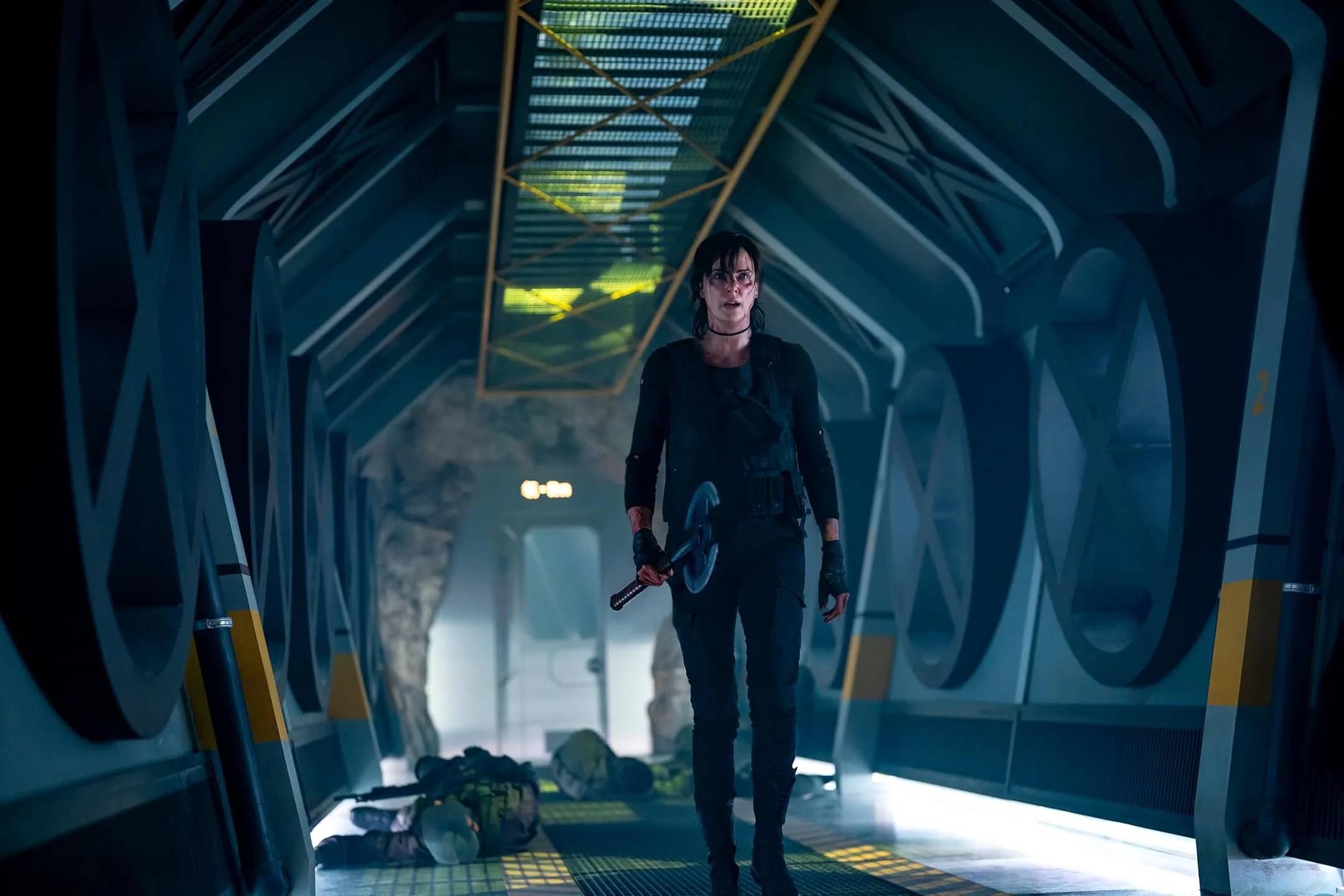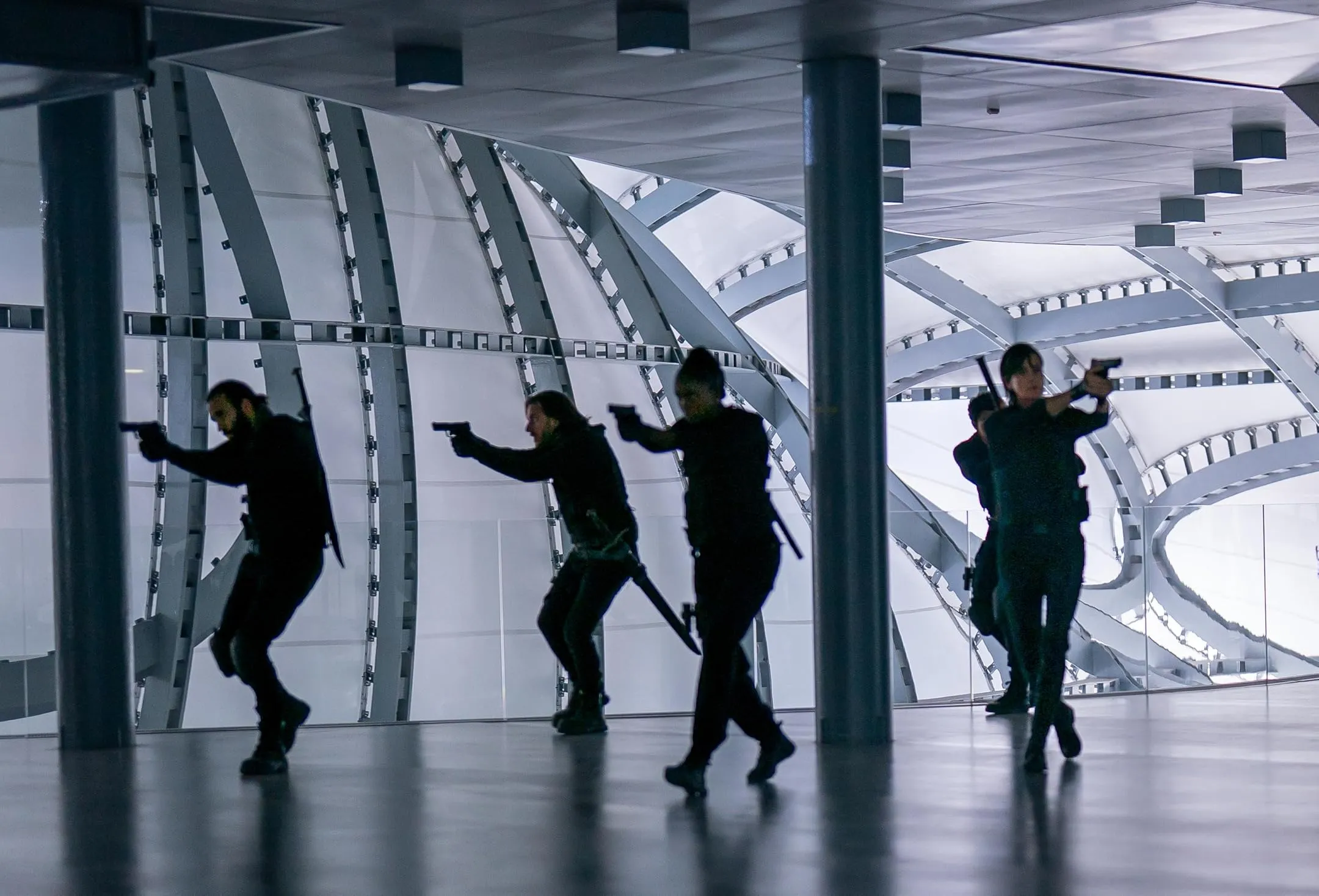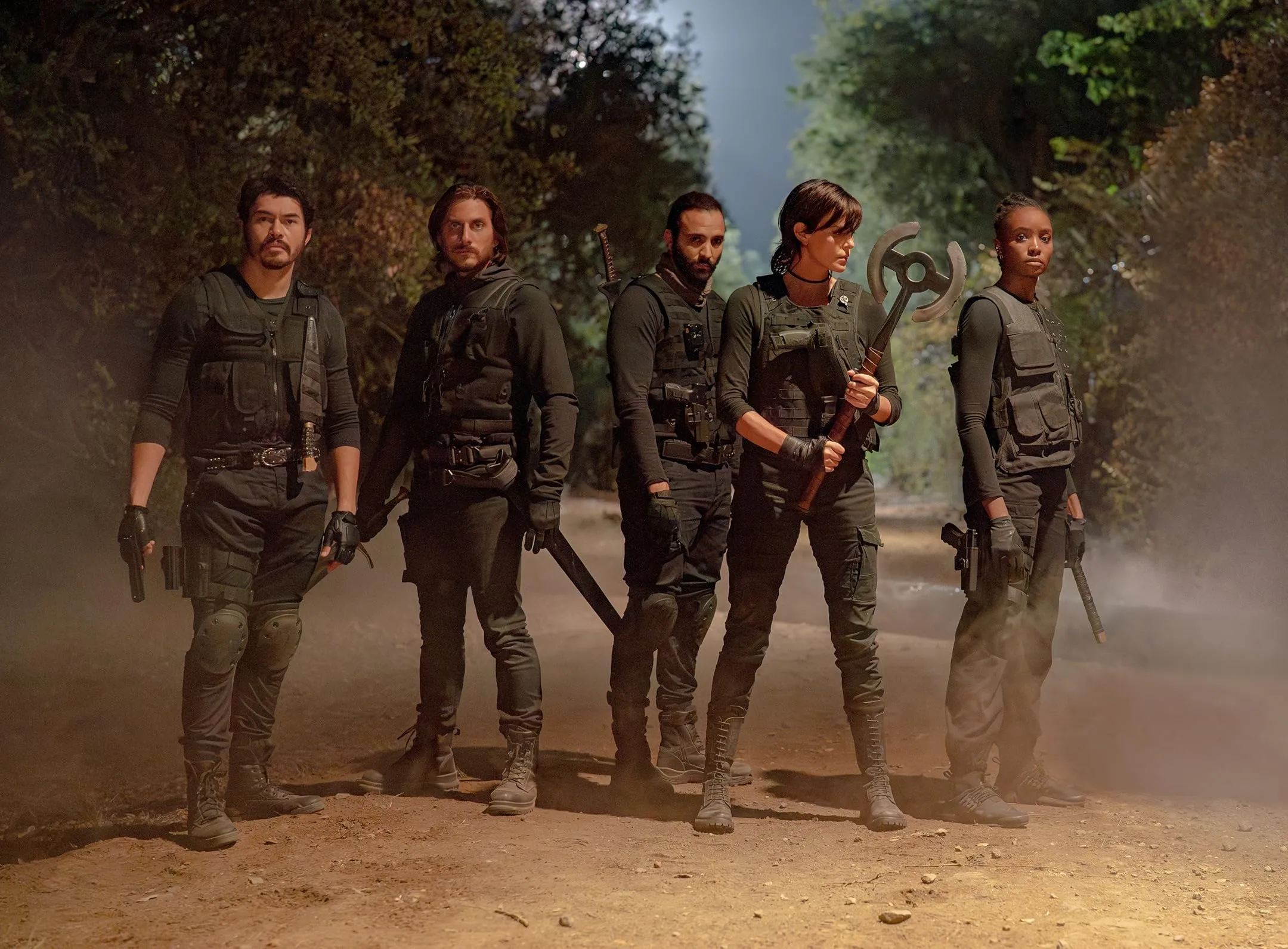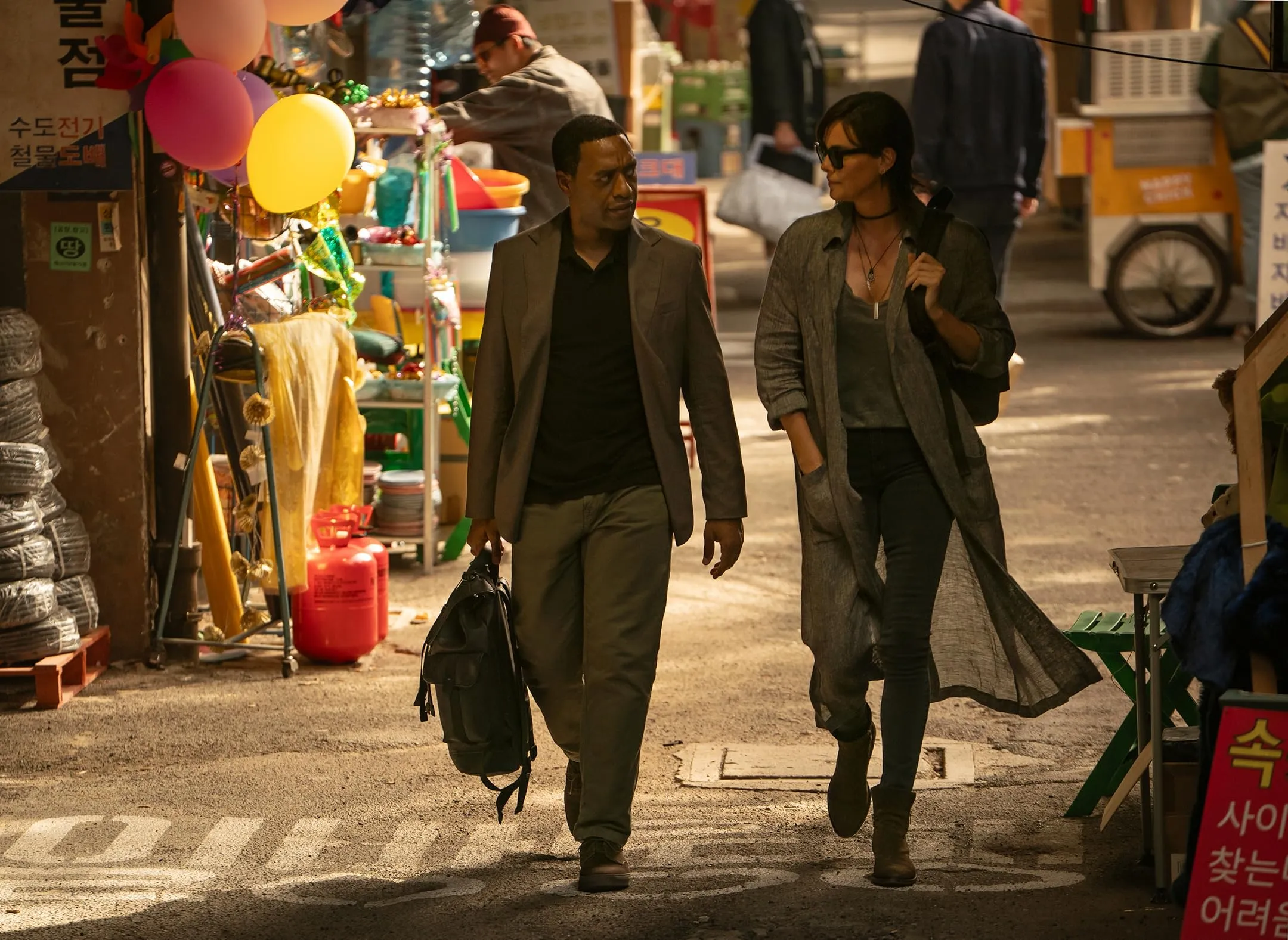The first film presented a compelling paradox: a team of warriors for whom death was a forgotten concept, their centuries of existence layering high-stakes action with a profound existential weariness. The Old Guard 2 returns to this world only to shatter its foundational rule.
The team’s eternal anchor, their leader Andy (Charlize Theron), is now mortal. This inversion of her nature sends ripples through the group, fundamentally altering the stakes of every battle and every decision. The sequel picks up the threads of a narrative already frayed by internal strife, with the exile of Booker (Matthias Schoenaerts) leaving a wound on their found family.
Yet a far older and deeper wound is torn open with the reemergence of Quynh (Van Veronica Ngo), Andy’s first companion, who surfaces after five centuries of unspeakable torment at the bottom of the sea. The stage is thus set for a conflict defined by new fragilities: how does a vulnerable leader command an invincible team, and what vengeance is wrought by a ghost from a past that refuses to drown?
The Weight of Water and Time
The film finds its true, beating heart not in global threats, but in the intensely personal schism between Andy and Quynh. Quynh’s return is no simple reunion; she is a specter forged in the lightless pressure of the abyss, having endured a 500-year cycle of drowning and resurrection inside a steel coffin.
This unimaginable torment has scoured away everything but a singular, incandescent rage—at the world that condemned her, and at the woman who was supposed to be by her side until the end. Her reemergence is not a rescue but an eruption, a geyser of historical trauma that threatens to drown the present.
Their inevitable confrontation is the film’s most electrifying sequence, a violent dialogue where every blow is a syllable of recrimination. It transcends mere choreography to become a physical manifestation of their fractured history, a clash of ideologies born from shared centuries and a singular, unforgivable moment of separation.
The narrative wisely leaves the precise nature of their bond—a deep friendship, a romantic love—shrouded in the mists of time, and this ambiguity lends their conflict a potent, aching gravity. For Andy, now stripped of her immortality, Quynh represents more than a physical threat.
She is a living monument to Andy’s greatest failure, a reckoning that arrives just as she has become breakable. Facing this ghost from her past without the shield of eternal life forces a confrontation not just with an old friend, but with the accumulated weight of her own guilt.
An Unbalanced Ensemble
Beyond the central conflict, the wider ensemble orbits with varying degrees of purpose. Nile (KiKi Layne) has fully shed her neophyte skin, ascending from apprentice to a confident partner whose relationship with Andy is reforged by the latter’s newfound fragility.
Their dynamic shifts from mentorship to a complex sisterhood, providing one of the film’s more compelling throughlines. Elsewhere, Joe (Marwan Kenzari) and Nicky (Luca Marinelli) remain the story’s unwavering emotional heart, their centuries-spanning love a warm, steadying presence. Yet their role feels diminished, their interactions often confined to moments of levity that, while welcome, shrink their narrative footprint.
The periphery is more uneven. Booker’s (Matthias Schoenaerts) return from exile offers a somber, resonant subplot, his quest for absolution lending a necessary note of quiet contrition to the proceedings. But other figures fare worse. The considerable talents of Chiwetel Ejiofor and Henry Golding are largely squandered on characters who function as little more than elegant exposition machines.
As the team’s human guide, Copley, and a newly introduced immortal historian, Tuah, they exist primarily to dispense plot-critical information. Their presence feels more architected than organic, their roles serving the mechanics of the script rather than the soul of the story.
A Divided Malice
The film’s central narrative fractures under the weight of two competing antagonists, one born of pathos and the other of plot necessity. Quynh stands as the story’s authentic foe, her quest for vengeance a direct and deeply personal consequence of the lore’s brutal logic. Her rage is comprehensible, her pain is palpable, and her historical bond with Andy gives their conflict a genuine, tragic weight.
The narrative needs no other villain. Yet, it introduces one in Discord (Uma Thurman), an ancient immortal whose motivations are a pastiche of archetypal world-ending ambitions. She feels less like a character and more like a concession to genre convention, a grand but hollow threat designed to raise the stakes externally when the real drama was always internal.
This addition proves to be a significant miscalculation. The tantalizing prospect of a showdown between Theron and Thurman, two titans of action cinema, dissolves into a perfunctory and underdeveloped rivalry. Their few shared scenes lack the charge of the Andy-Quynh dynamic. Ultimately, Discord’s presence serves only to dilute the narrative’s focus, pulling attention from the potent, character-driven conflict with Quynh toward a more generic, world-ending plot.
The film juggles a deeply personal specter of betrayal with a schematic supervillain, and in doing so, it overcomplicates its story and weakens its most powerful emotional currents. Thurman’s performance, relying on broad strokes of menace, reflects the character’s place in the narrative architecture: a function, not a force.
The Choreography of Conflict
The film’s execution is a study in contrasts, marked by a noticeable shift in directorial sensibility. Victoria Mahoney’s approach is polished and maintains a confident pace, yet it often lacks the synthesis of muscular action and emotional depth that defined its predecessor. The result is a film that feels more competent than thrilling, with certain sequences adopting a more frantic, jittery aesthetic that can obscure rather than enhance the impact of the combat.
Still, there are moments of exceptional clarity and force. The opening set-piece, a raid on a magnificent Croatian villa, is a masterclass in controlled chaos, an explosive sequence of brutal beatdowns and a pulse-racing car chase that represents the film at its most exhilarating. Likewise, the alleyway duel between Andy and Quynh remains a standout, a fight that succeeds because its violence is a conduit for history and heartbreak.
These moments, however, only serve to highlight the underwhelming nature of the climax. The final confrontation, set within the dim, generic confines of a nuclear facility, dissolves into a visually murky affair reliant on weightless CGI.
The much-anticipated showdown between Andy and Discord lands with a thud, a perfunctory clash that squanders its potential. The film is far more effective when it finds grim humor in its premise—a dismembered thumb casually pressed back into place—than when it aims for a grand, explosive finale.
The Unending Wait
The film does not conclude; it simply stops. This is not a carefully placed sequel hook but an abrupt cessation of narrative, leaving every significant emotional and plot thread dangling in a void of unresolved tension. The story feels less like a chapter and more like a document severed in half, its most vital conflicts arrested mid-beat.
This structural decision is a profound miscalculation, substituting the satisfaction of narrative closure for a frustrating sense of incompletion. It engenders impatience rather than anticipation. In a story centered on characters for whom time is almost meaningless, the choice to so flagrantly disregard the audience’s finite span is a striking irony.
While the film is elevated by strong performances and contains moments of genuine emotional power and visceral action, these strengths are ultimately compromised by its deeply unsatisfying non-ending. It stands not as a complete work, but as a precarious, unfinished bridge to a third chapter that may or may not ever arrive.
The Old Guard 2 Released exclusively on Netflix on July 2, 2025.
Full Credits
Director: Victoria Mahoney
Writers: Greg Rucka, Sarah L. Walker
Producers and Executive Producers: David Ellison, Dana Goldberg, Don Granger, Charlize Theron, Beth Kono, A.J. Dix, Marc Evans
Cast: Charlize Theron, KiKi Layne, Marwan Kenzari, Luca Marinelli, Matthias Schoenaerts, Vân Veronica Ngô, Chiwetel Ejiofor, Uma Thurman, Henry Golding
Director of Photography (Cinematographer): Barry Ackroyd
Editors: Matthew Schmidt
Composer: Steffen Thum, Ruth Barrett
The Review
The Old Guard 2
The Old Guard 2 offers moments of genuine brilliance, fueled by the powerful emotional conflict between Andy and Quynh and a commanding performance from Charlize Theron. However, these highlights are nearly undone by an underdeveloped secondary villain and a narrative that sidelines its supporting cast. The film’s greatest sin is its abrupt, unsatisfying cliffhanger, which renders the entire experience frustratingly incomplete. It's a story severed in half, making it more of a precarious prelude than a worthy sequel.
PROS
- An emotionally charged and compelling conflict between Andy and Quynh.
- Charlize Theron’s strong, charismatic lead performance.
- A dynamic and well-choreographed opening action sequence.
CONS
- An abrupt, deeply unsatisfying cliffhanger ending.
- A generic and underdeveloped secondary villain.
- The supporting cast feels largely underutilized.



















































